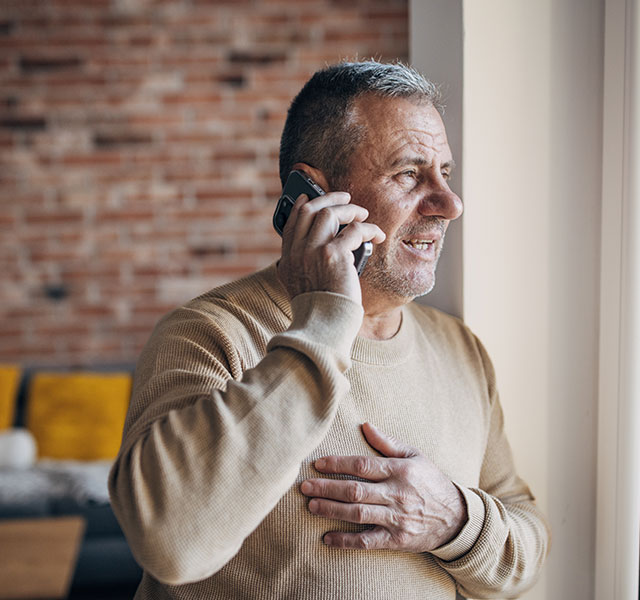You can never plan for when a heart attack may occur, so there is always a chance you might begin to experience symptoms when you are alone. When that is the case, being able to remain calm and act quickly is your best chance for survival.
Here, Carina Fadel, M.D., a cardiologist at Henry Ford Health, answers a few questions about spotting heart attack symptoms and how to seek medical attention.
Who Is At Risk Of A Heart Attack?
Dr. Fadel: Some people are at greater risk than others. This includes individuals who have:
- A family history of heart disease
- Diabetes
- A history of smoking or currently smoke
- High cholesterol
- High blood pressure

How Do I Know If I Am Having A Heart Attack?
Dr. Fadel: While the most common symptoms of a heart attack include chest pain, pressure or tightness that worsens with exertion, symptoms can vary between men and women. Men are more likely to present with chest discomfort that may radiate into the jaw or left arm. Women can present with atypical symptoms such as abdominal pain, lightheadedness, fatigue, or shortness of breath with or without chest pain.
What Should I Do If I Think I Am Having A Heart Attack?
Dr. Fadel: If you are having any of these symptoms, it is important to seek medical attention immediately. Call 911. Even if your symptoms change or go away, you still need to be evaluated by medical professionals right away.
You might also consider taking an aspirin. If you are having a heart attack, aspirin can help reduce your risk of further heart damage.
After calling 911, be sure to take it easy. While symptoms might make you anxious, it is important to stay calm. Additionally, avoid overexerting yourself. Even getting up or moving around while experiencing heart attack symptoms can make your symptoms worse. Instead, be sure to unlock the door for the emergency medical professionals and take a seat while you wait.
Preparing For A Heart Emergency
Whether you or someone in your family has a heart attack, it is important to be prepared and take any symptoms seriously.
Dr. Fadel recommends keeping aspirin on hand if symptoms develop. Additionally, if you have a known history of high blood pressure, you may benefit from having a home blood pressure cuff.
“Even if you aren’t sure if what you are experiencing is a heart attack, it is still recommended that you seek medical attention for further evaluation,” says Dr. Fadel. “It is very common for people to dismiss heart attacks as indigestion or heartburn.”
Just remember – never drive yourself to the hospital. Driving while potentially having a heart attack can be extremely dangerous to you and others around you. It is always best to call 911 even if your symptoms are inconsistent.
Reviewed by Dr. Carina Fadel, a cardiologist who sees patients at the Henry Ford Women's Heart Clinic - Southfield Providence Hospital and Henry Ford Consultants in Cardiology - Farmington Hills, Ferndale and Novi.



